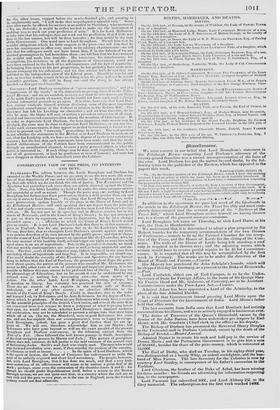CONSERVATIVE VIEW OF TIIE PRESS, in INTERESTS AND DUTY.
STANDARD—The schism between the Lords Brougham and Durham has txtended to the Weekly Press; and we are sorry to see the two most able menu-
hers of that department of our order which incline to Revolution politics, tak-
ing that side which we do not think the side of justice. The Exaniincr and the Spectator had yesterday each more than one article directed against the Chan-
cellor. Nov, this bitter hostility we hold to be under the circumstances unwise and ungrateful as well as unjust. Though the press may owe nothing to Lord firongham but forbearance from persecution, that is a debt greater than any one can say it owes to Lord Durham. Granting that Lord Brougham has, under some provocation, spoken harshly of the press in the House of Lords and in the Edinburgh Review, still such speaking does not depart from the principle of free and manly controversy. How different has been Lord Durham's dealing with us. Ile has not met us in speeches and in Review articles, but in the streets of Newcastle, and in the Court of King's Bench ; he has nut attempted ti put us down by argument, or even by dogmatism, but by false ehargeS grounded upon Mfidavits to which the Court of King's Bench would give no credit. It is not Lord Durham's fault that there is, at this moment, a press in England, free for any purpose but to do his Lordship's bidding.
11-e say, therefore, that to champion Lord Durham's quarrel against any man, is an unwise desertion of its own interest by the public press ; and that to chant-
pan the cause of Lord Durham against an opponent like the Chancellor, who, by the very manner of his hostility itself, acknowledges our right to meet him with equal arms, is an act of ingratitude. But, in the quarrel as it stands, we think
that our weekly contemporaries are unjust as well as being ungrateful and un- wise. The first ,,roofs of their injustice may, indeed, be found in the same facts convicting them of ingratitude and impolicy. It is impossible, we should say, if we could doubt the sincerity of the Examiner and Spectator, for any human being to believe that the Earl of Durham, the prosecutor about flags, the prose- cutor about quoits, the patron of the persons who assaulted Mr. Ilernaman, the mover in fifty other cases of acts of intolerant and imperious powers, it is im- possible to believe this man sincere in his professed love of liberty. He may use the phraseology of Liberalism, but iu his mouth it can be understood by any rational roan as nothing but unmeaning cant—the mere motto of a faction. On the other hand, Lord Brougham, professing, perhaps, less of devotion to liberty, has certainly less practised the arts of tyranny. There are no records of his exploits in the county rolls of North- umberland, or of any other county ; no abortive affidavits in the records of the Court of King's Bench. Credit is, therefore, due to the noble and learned I trd, by Reformers, and by Anti-Reformers, for the degree of Libe- ralism which he professes. If there arc any Reformers who really have a respect for the essential principles of the British Camt:tution, and who at the same time can C0111111iIIILI sense and temper to form a judgment of what is passing before their eyes, we would ask them, whether Lord Brougham's imputed tardiness and moderation, may not be calculated to prevent a relapse into that state from which all of us, (for we, the Standard, were as good Reformers five years ago, and not less explicit than our contemporaries), were so happy to escape. Lord Brougham, indeed, has gone a great deal further than we call ap- prove of. We will not, therefore, acknowledge him as our Martin : but Reformers who have gone beyond us will see the exact parallel of the present Brougham and Durham controversy, in the following extract front the Tole of a Tab. [Here followed the well known passage in Swift, descriptive of the coat-stripping process by Martin and Jack.] This picture of precipitate reform does not, however, do full justice to the mad rashness of the present race of Reforming Jacks. Swift's mad Jack was simply mad. The men who would urge forward revolution now, must, if they consider the position of the country, lme villanous as well as insane In the spirit of Lord Durham, which is the spirit of faction, the House of ComMons has endeavoured to make the most of its unfairly acquired and short-lived ascendancy. The people, however, feel, with Lord Brougham, that it has done too much, and that a very little more extension of its officiousness will cause to be undone a great deal of its work ; perhaps, cause even the restoration of the shoulder-knots A and B fur though we should prefer Republicanism itself, before a return to the Rotten Borough system, we are not quite sure that, in A country where the rich are so very rich and the poor so very poor, as is the case in England, even the darkest tyranny would not find adherents.


















 Previous page
Previous page